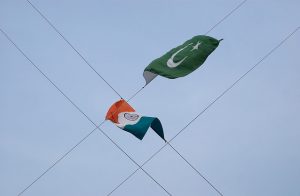By Abhijnan Rej

A new media report substantiated a recent claim that the United Arab Emirates (UAE) had midwifed the February 25 India-Pakistan ceasefire. On March 22, Bloomberg noted “the India-Pakistan cease-fire marked a milestone in secret talks brokered by the UAE that began months earlier, according to officials aware of the situation who asked not to be identified.”
“The cease-fire, one said, is only the beginning of a larger roadmap to forge a lasting peace between the neighbors […],” the outlet also claimed. Writing for Foreign Policy on March 4, Indian journalist Sushant Singh had also noted officials from both sides had conformed that the UAE “played an important role in bringing the two countries together once discussions started in October 2020.”
While India and Pakistan have previously (on at least three recent occasions, in 2013, 2015, and 2018) recommitted themselves to the informal 2003 ceasefire along the Line of Control and a segment of the India-Pakistan international border that Pakistan considers a “Working Boundary,” it is increasingly clear that the February 25 announcement is qualitatively different – and provides grounds for cautious optimism.
The ceasefire announcement comes amid a radically different approach to Pakistan’s security and foreign policy, centered on a geoeconomic pivot, that the country’s top civilian and military leaders have pitched in the recent months. And peace with India (and resolution of the Kashmir dispute, in particular) is a necessary condition for this approach to succeed, as Pakistan Army chief General Qamar Javed Bajwa himself admitted in a March 18 public address in Islamabad.
While India-UAE relations have significantly deepened under the Narendra Modi government – and improvement of India’s relations with Sunni Gulf powers is a key foreign policy achievement of Modi’s over the past seven years – sections of the Indian media have pointedly argued that Pakistan’s relations with these countries have been on a downswing over the recent years. Writing in November last year, a Hindustan Times editor, Shishir Gupta – widely perceived to be close to the Indian national security establishment – described “a sharp downward spiral” in Pakistan-UAE relations, based on his sources in the Indian government.
Ascribing this downturn to a wide range of factors, including alleged Pakistani anger at the UAE’s decision to recognize Israel, Gupta had, interestingly enough, noted, “Islamabad’s efforts to involve West Asian nations in issues concerning its relationship with New Delhi haven’t gone down well in both countries, the people familiar with the matter added.”
But as it now transpires — based on both the recent Bloomberg article as well as the earlier Foreign Policy reporting – the UAE has played a key, constructive role in brokering peace between the arch-rivals. To be sure, for Gulf petrostates, relations with India ought not to come at the expense of ties with Pakistan. As far as they are concerned, keeping relations with Pakistan on an even keel is a key component in arresting Islamabad’s swing away from traditional Sunni power centers, and toward Iran, Malaysia, and Turkey. On the other side of the equation, despite Pakistan’s occasional threats and tantrums, the fact of the matter remains that its economic and commercial ties with the UAE and Saudi Arabia remain too significant for it to ignore their concerns — and nudges — outright.
Historically speaking, the UAE and Saudi Arabia have been, by and large, sympathetic toward Pakistan and its concerns. But as India’s ties with both deepened, Islamabad has been rankled by their aloofness toward what it perceives as Indian intransigence in the region. Following the August 2019 decision by the Modi government to revoke Jammu and Kashmir’s special constitutionally-guaranteed autonomous status, the UAE’s position on the decision as an internal Indian matter came as music to the ears of Modi. Abu Dhabi had described the Modi government’s decision as one that would target “reducing regional disparity and improving efficiency.”
Incidentally, this would not be the first time in the recent years that the UAE has reportedly played an important role in securing peace between India and Pakistan. Soon after the dust-up between the two countries following Indian airstrikes on mainland Pakistan in February 2019, reports emerged that the UAE had also played a mediating role in securing the release of an Indian pilot who was held captive in Pakistan after his jet was shot down as it tried to repel a Pakistani retaliatory attack on February 27.
“The government of the UAE said Abu Dhabi Crown Prince Sheikh Mohammed bin Zayed al-Nahyan held talks with both [Indian Prime Minister Narendra] Modi and Pakistan Prime Minister Imran Khan,” the wire service Reuters noted at the time.
No comments:
Post a Comment